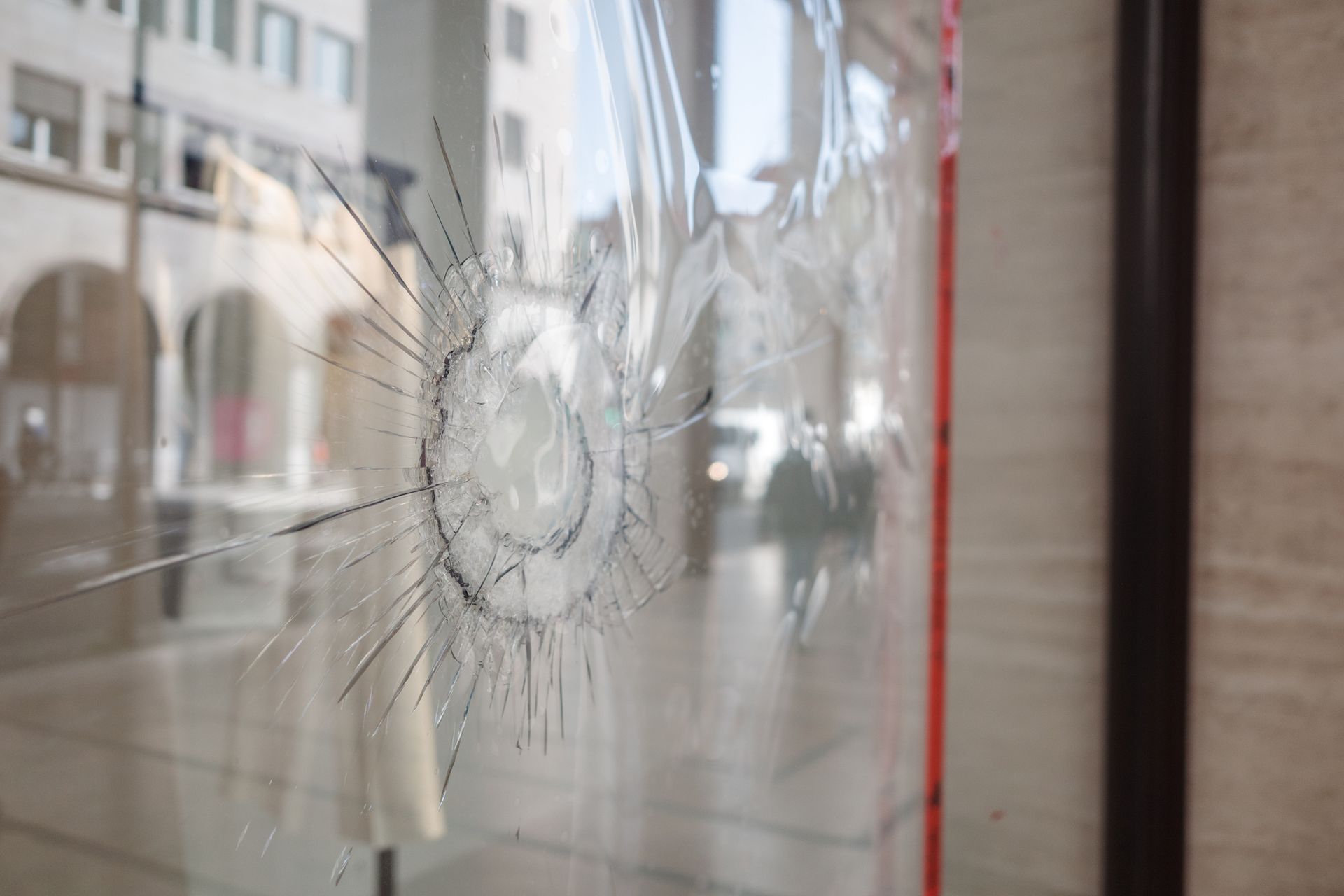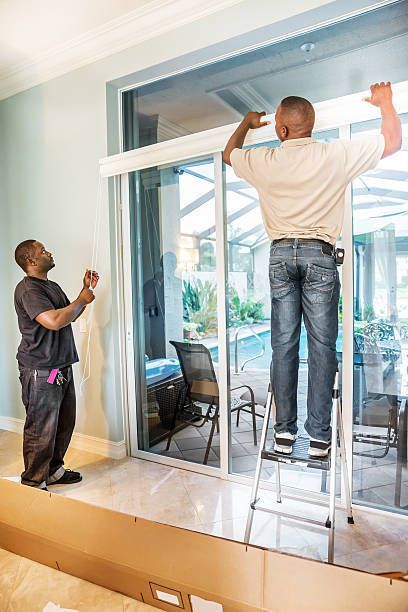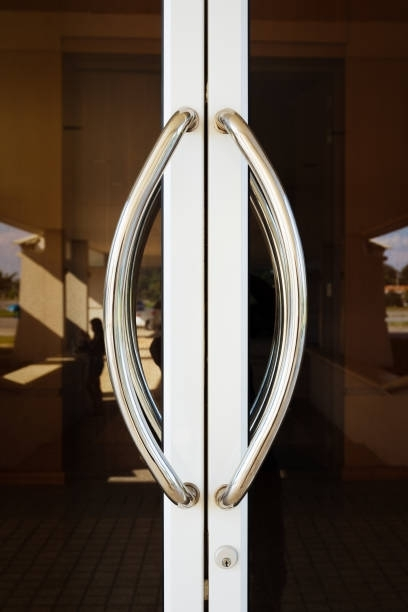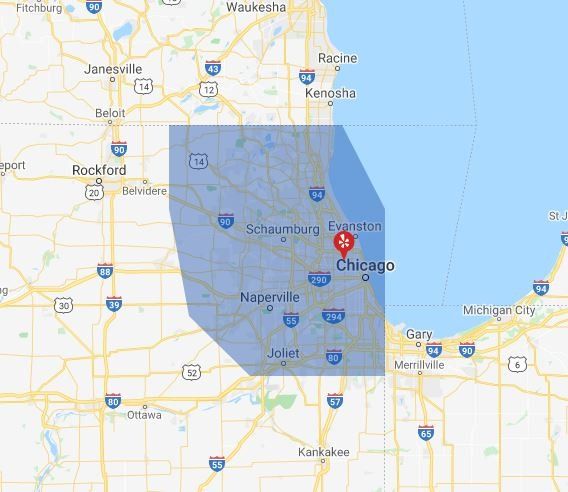HOW TO CHOOSE THE RIGH DOOR CLOSER
websitebuilder • February 19, 2021
One of the most important mechanisms installed on your commercial doors is the door closer. Without a proper closer your doors could be slamming shut causing damage to the door and frame or not closing at all letting valuable energy escape and compromising building security.
To ensure you’ve got the proper equipment installed, follow these basic tips before deciding on a door closer.
QUESTIONS TO CONSIDER
One of the most important mechanisms installed on your commercial doors is the door closer. Without a proper closer your doors could be slamming shut causing damage to the door and frame or not closing at all letting valuable energy escape and compromising building security.
To ensure you’ve got the proper equipment installed, follow these basic tips before deciding on a door closer.
First and foremost, you need to be able to answer these basic questions in order to narrow down your door closer choices:
1) How much traffic does this entrance see?
2) What is the size and weight of the door?
3) What are the backswing requirements?
4) Am I looking to outfit an interior or exterior door?
5) What is my budget?
These will help you determine which direction to start looking in.
DOOR CLOSERS BASED ON TRAFFIC
Some door closers are better for high traffic areas. A durable option is the overhead door closer – best used for medium to heavy traffic – and can be used on either interior or exterior doors. They’re also the most common door closer on the market. The three main types of overhead door closers are:
REGULAR ARM
Installed on the outside of the door, this door closer juts out from the door frame, never laying flush with the door. However, this is the most power-efficient option available.
PARALLEL ARM
With an arm that sits parallel with the door when closed, the parallel arm option are most common in schools and commercial buildings as they minimize the opportunity to vandalize doorways. Keep in mind they’re not the most power-efficient.
TOP JAMB
If you’ve got a glass or aluminum door frame, a top jamb door closer is your best option. The spring loaded box which enables the door to close on its own is mounted on the face of the doorframe.
HEAVY DUTY DOOR CLOSERS
If you’ve got a heavy traffic zone you may consider something a bit more heavy duty in which case a floor-spring or overhead spring closer would be more appropriate. This variety is not visible like the traditional overhead door closer, so if you’re concerned about aesthetics this would also be a good option.
A floor-spring door closer is great for glass door storefront locations. Installed in the floor, the closer is fitted to the bottom of the door making it less visible. This variety will generally come with an option to leave the door propped open and just provides a more sleek look to your entryways.
OTHER THINGS TO CONSIDER
If you have
automatic door openers
you’ll need to keep these in mind when choosing a door closer. Many automatic door openers have a closing mechanism of their own and installing more hardware on top of that may cause damage to your door.
Building codes will have an impact on the type of door closers you install. Every jurisdiction is different when it comes to building code requirements. Check with the Builders Hardware Manufacturers Association, American National Standards Institute and the American with Disabilities Act requirements. Each of these resources will keep you within code requirements.
Don’t forget that just because your doors are now closing perfectly on their own that you still need to install locking mechanisms appropriate for your doors. The doors may be shutting on their own but you’d like them to stay that way!
If you’re interested in equipping your doors with automatic door closers, contact a professional to ensure proper installment.

Keeping your doors and locks in tip top shape means performing regular maintenance on them. Since a door is probably the one thing in every building that is used multiple times per day, they’re bound to need a little maintenance. Commercial doors can come with a hefty price tag and so you want to keep them maintained. Just like your vehicle, if you neglect all the moving pieces they’re bound to bust. So, how do you take care of a door? KEEP IT LUBRICATED Just like the Tin Man, your doors need to be lubed up every now and then to keep components moving smoothly and to prevent damage. WD-40 is one tried and true method of lubrication, but it’s generally used for parts that are already grimy. Using a Teflon based lubricant on a regular basis will help keep your door swinging freely minus any friction. Try to create a regular cadence for this task. You don’t want to wait until the hinges on your doors are so dry that they could need premature replacement. CLEAN THE STRIKE Have a door that doesn’t quite close all the way? You could be looking at a dirty strike. Many times debris like trash or dirt can get in there and clog it up preventing the strike from working properly. Leaving your strike in this condition for extended periods of time may cause damage due to the increased resistance from the door to latch and, not to mention, compromising your security. Read more about electric strike locks for your business in this post. SPOT CHECK You should be doing spot checks on all the doors on a regular basis. This means looking for loose screws or improperly functioning components. As an example, a door closer on commercial doors is one element that needs to be routinely checked. It has to be functioning just right to keep your building safe. If it’s closing too slowly you give people time to sneak in behind employees…too fast and you could be damaging the door with repeated slamming. Repairing commercial doors can be a pain so this should be on your priority list. APPROPRIATE HARDWARE While we hope that you took this into consideration when initially choosing your doors and hardware , it’s not unheard of to realize your first choice wasn’t the best choice. If you notice that the doors seeing the most traffic in your building seem to be degrading at a quicker rate than you’d like, it’s likely you’ll need to invest in some higher grade hardware. If you recognize the need to upgrade you’ll likely need to utilize a rekeying or lock changing service especially if you’ve incorporated a master key system into your commercial space. Due diligence pays off when it comes to regular door and lock maintenance . Set up reminders on your calendar to check them to avoid larger, more costly issues in the future. Need help with your commercial locks ? Contact Epic Door Repair and we’ll be happy to help!

Updating your doorways’ hardware should always be an item on your building maintenance checklist. After years of repeated use, the mechanisms are bound to need replacing at one point or another. If you’ve found yourself in this situation, consider adding exit devices to your entries if you haven’t already. Modern hardware adds several safety and compliance benefits to your business but not all are best suited for every type of door. Here are some things to consider before committing to an exit device. The type of door you have will dictate the type of exit device you choose. Exit devices can be fitted to single or double door openings. If you have a double door, you’re able to fit a mullion (a vertical bar separating the doorway down the center between the two doors) to provide latching points for each door. Decide if you mind having the doorway cut in half by this bar. If you want a completely unobstructed doorway when both doors are opened, you’re able to secure both doors without a mullion by using a vertical rod exit device paired with a mortise exit device. The materials your existing doors are made of will also play a part when selecting your exit devices. Wood, hollow metal and aluminum are usually compatible with all types of exit devices. If you have an aluminum glass door with a narrow stile you’ll need to consult a locksmith to be sure you’ve chosen the right variety of exit device. DO YOU NEED FIRE RATED DEVICES? Exit devices are separated into two categories: fire rated and non-fire rated. If you’re looking for a more cost-effective option, the non-fire rated devices are a good fit. Keep in mind you can only have a fire rated exit device installed if you have a fire rated door. These particular exit devices are manufactured to suit the requirements of fire rated entries. Also, if you’re planning to have electrified dogging you must wire everything through your building’s alarm system that would release the dogging in case of a fire. Fire rated exit devices are much more secure and provide an added level of protection in case of an emergency. But, if you don’t already have fire rated doors and are not planning to replace existing doors, the non-fire rated devices will get the job done nicely. WILL OPERATIONAL NOISE BE AN ISSUE? If your facility requires a certain level of noise control, you won’t want to purchase a motor operated exit device. Places like dorms, hospitals, doctors offices and educational facilities may find that a motorized mechanism would be too distracting. WHERE IS THE DOOR LOCATED? If you are outfitting a doorway that opens to the exterior of the building be sure to purchase an exit device that is weather proof. In cases of extreme weather, mechanisms within an exit device may malfunction. Owning a business in the Chicago land area, this should be the top priority when making your decision. There are many variables to consider before purchasing your exit devices and a professional technician should always be consulted to ensure you’re making the right choices from the start.
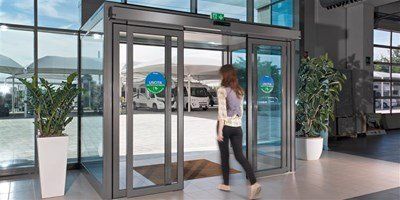
While automatic doors have become more or less the status quo, there are still several business owners who have yet to take the plunge. Reasons for not updating from traditional push doors include fear of costly maintenance and installation fees, or simply not seeing them as a necessity. However, with the return you receive in the form of customer satisfaction, convenience and even monetarily, they’re well worth the effort to install.
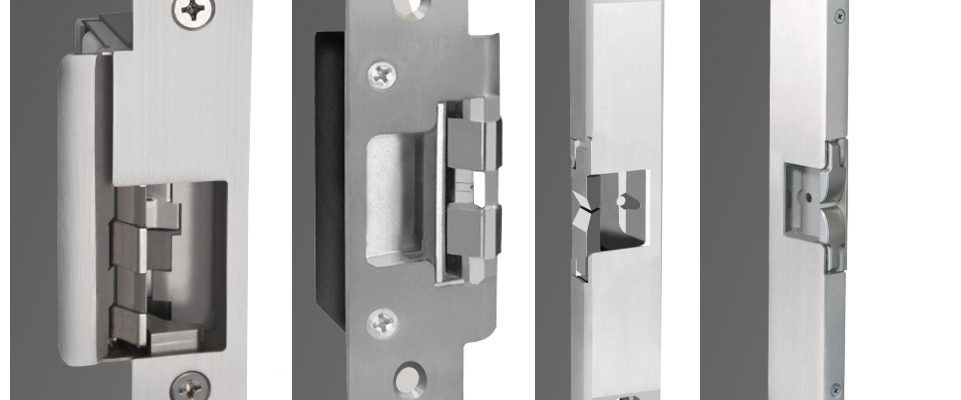
Electric strikes are devices installed on doors to allow entry via an access system or remote release system. Unlike a magnetic lock, a strike does not secure a door; that’s the responsibility of the door handle or lockset. The electric strike allows access to a secured door with a key card, pass, etc., without the need for a key to the lockset. TYPES OF ELECTRIC STRIKE LOCKS There are two styles of electric strike lock: FAIL-SAFE LOCKS Fail-safe locks (also called fail-open) operate as a magnetic lock would. A direct electric current is applied to the strike, causing the door to lock. In a power failure, the door can be pushed or pulled open. FAIL-SECURE LOCKS Fail-secure locks (also called non-fail safe or fail-locked) open when an electric current is applied to them. In a power failure, this kind of lock will remain locked, although the mechanical can still be used to open the door from the inside. An electric strike lock is useful on any door where high traffic occurs and requires monitoring or where items need to be secured and safeguarded . It also regulates employee access and helps prevent employee theft. CHOOSING AN ELECTRIC STRIKE LOCK Choosing the right kind of electric strike lock depends on the kind of door you have. The door material, and whether the door is internal or external, double or single, determines which electric strike lock is best. Strikes are available for nearly all door styles and of various material types, like aluminum and timber. SECURITY AND MONITORING REQUIREMENTS The level of security desired will impact the type of strike that is best for your doors and circumstance. For example, a low-security situation with no defined holding force may only require a low-cost electric strike. However, in a high-security environment, a strike with a maximum holding force of 1,500 pounds or more may be necessary. Most electric strike manufacturers produce strikes with or without a monitoring facility. Door state monitoring should involve the use of a separate reed switch on the door or frame. TYPE OF LOCKSET Your electric strike lock must be compatible with the type of lockset on your door. Use the lockset manufacturer’s compatibility chart to determine if your electric strike works with the lockset in question. LATCH BOLT DIMENSIONS Similar to a lockset, your choice of electric strike lock will need to accommodate the type of lock bolt sizes. Make sure that the centerline location of the latch bolt is correctly positioned around the centerline of the lockset to ensure that the lock will work as desired. POWER NEEDS Most electric strike locks are 24 VDC, although 12 and 24 VAC options are also available. Choosing AC or DC power is critical because each strike application is different. Consider regulated or filtered power sources where practical as these sources will extend life to the strike’s operating capacity. CODE COMPLIANCE Fail-secure electric strike locks must be used on fire-rated doors so that the door automatically goes into a locked position when the power is turned off. Because fail-safe locks go into an unlocked state when no power is applied, they do not meet code requirements for fire doors. Consult a technician if you are uncertain about what kind of electric strike lock you need for your building or office.

Electric strikes are devices installed on doors to allow entry via an access system or remote release system. Unlike a magnetic lock, a strike does not secure a door; that’s the responsibility of the door handle or lockset. The electric strike allows access to a secured door with a key card, pass, etc., without the need for a key to the lockset. TYPES OF ELECTRIC STRIKE LOCKS There are two styles of electric strike lock: FAIL-SAFE LOCKS Fail-safe locks (also called fail-open) operate as a magnetic lock would. A direct electric current is applied to the strike, causing the door to lock. In a power failure, the door can be pushed or pulled open. FAIL-SECURE LOCKS Fail-secure locks (also called non-fail safe or fail-locked) open when an electric current is applied to them. In a power failure, this kind of lock will remain locked, although the mechanical can still be used to open the door from the inside. An electric strike lock is useful on any door where high traffic occurs and requires monitoring or where items need to be secured and safeguarded . It also regulates employee access and helps prevent employee theft. CHOOSING AN ELECTRIC STRIKE LOCK Choosing the right kind of electric strike lock depends on the kind of door you have. The door material, and whether the door is internal or external, double or single, determines which electric strike lock is best. Strikes are available for nearly all door styles and of various material types, like aluminum and timber. SECURITY AND MONITORING REQUIREMENTS The level of security desired will impact the type of strike that is best for your doors and circumstance. For example, a low-security situation with no defined holding force may only require a low-cost electric strike. However, in a high-security environment, a strike with a maximum holding force of 1,500 pounds or more may be necessary. Most electric strike manufacturers produce strikes with or without a monitoring facility. Door state monitoring should involve the use of a separate reed switch on the door or frame. TYPE OF LOCKSET Your electric strike lock must be compatible with the type of lockset on your door. Use the lockset manufacturer’s compatibility chart to determine if your electric strike works with the lockset in question. LATCH BOLT DIMENSIONS Similar to a lockset, your choice of electric strike lock will need to accommodate the type of lock bolt sizes. Make sure that the centerline location of the latch bolt is correctly positioned around the centerline of the lockset to ensure that the lock will work as desired. POWER NEEDS Most electric strike locks are 24 VDC, although 12 and 24 VAC options are also available. Choosing AC or DC power is critical because each strike application is different. Consider regulated or filtered power sources where practical as these sources will extend life to the strike’s operating capacity. CODE COMPLIANCE Fail-secure electric strike locks must be used on fire-rated doors so that the door automatically goes into a locked position when the power is turned off. Because fail-safe locks go into an unlocked state when no power is applied, they do not meet code requirements for fire doors. Consult a technician if you are uncertain about what kind of electric strike lock you need for your building or office.
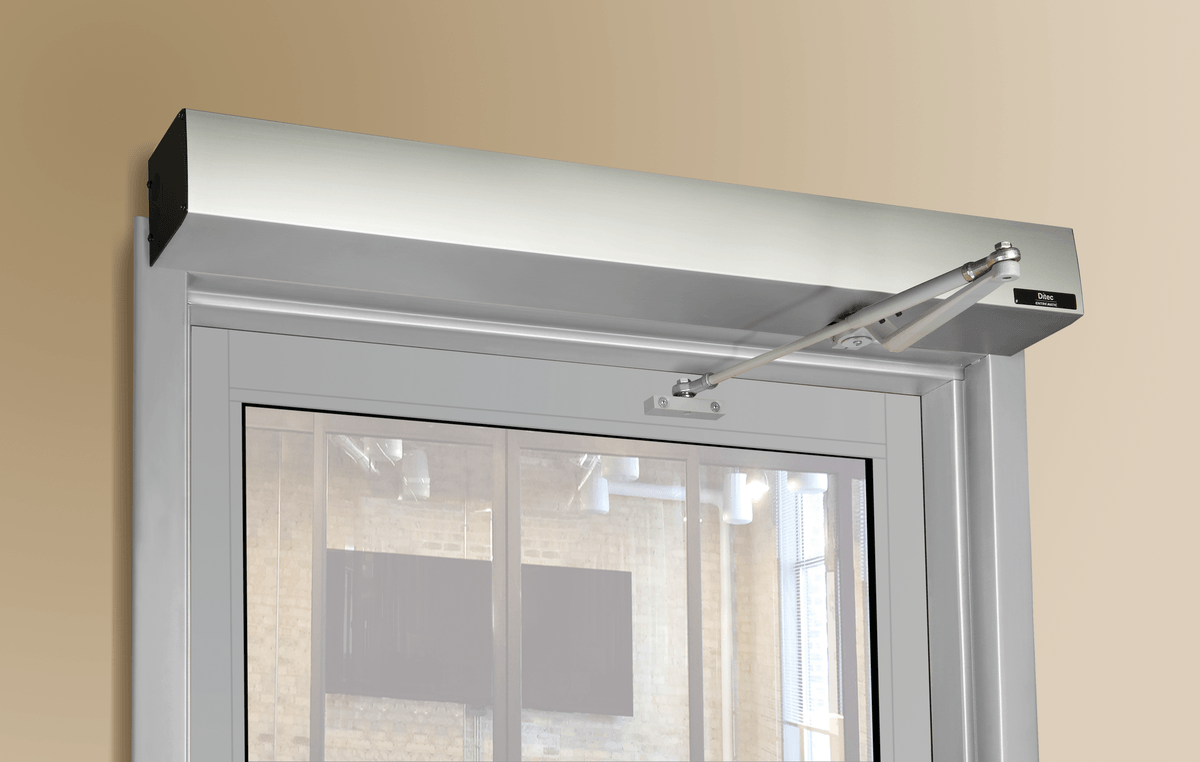
There are a lot of things to consider when running a business. Many people don’t think about things like locks for securing their business or the types of doors that would be a good fit. When picking your main entrance, you should certainly spend some time looking at automatic doors. They’re not just for supermarkets, there are many benefits that most businesses could take advantage of. Let’s take a look at a few advantages and benefits that you may not be aware of. EASY ACCESS Doors that open with motion sensors are great for businesses that have a lot of traffic. Different types of automatic doors have their own way of working so you can find the one that works best for you. Another issue that businesses deal with sometimes is traffic jams at the doorway. If someone is entering slowly or has to stop, it can cause a slowdown for people trying to enter your business. Automatic doors allow a stream of people to enter quickly. ADA COMPLIANCE The Americans with Disabilities Act ensures that everyone has easy access to places like your business. Automatic doors are a great way to make sure that your business is meeting the standards. There are a few ways to make your entrances and business exit secure and safe for everyone. Automatic doors that are connected to a switch on the wall is a popular way of making your door compliant. Individuals in wheelchairs or other devices can easily access this button to open the door. Automatic sliding doors also allow you to take advantage of the space in front of your building. If you’re building a ramp for those that need it, automatic doors give you more room since they are not opening out into the walkway. SAVINGS AND MAINTENANCE Anyone who has worked on a hot day knows that it doesn’t take long for a room to heat up when a door is left open. Traditional doors mean that your heating and cooling system will be working overtime. Installing a proper automatic door will keep your company cool in the summer and warm in the winter, making a comfortable place for your customers or visitors. WELCOME IN Having a quality and well-thought-out entrance to your business gives your customers a great first impression. Having automatic door openers installed not only increases your company’s reputation, but it also creates a friendlier experience for everyone. Making sure that the doors are installed correctly and securely is very important. When setting up your business, be sure to find a professional technician near you to get it done right.
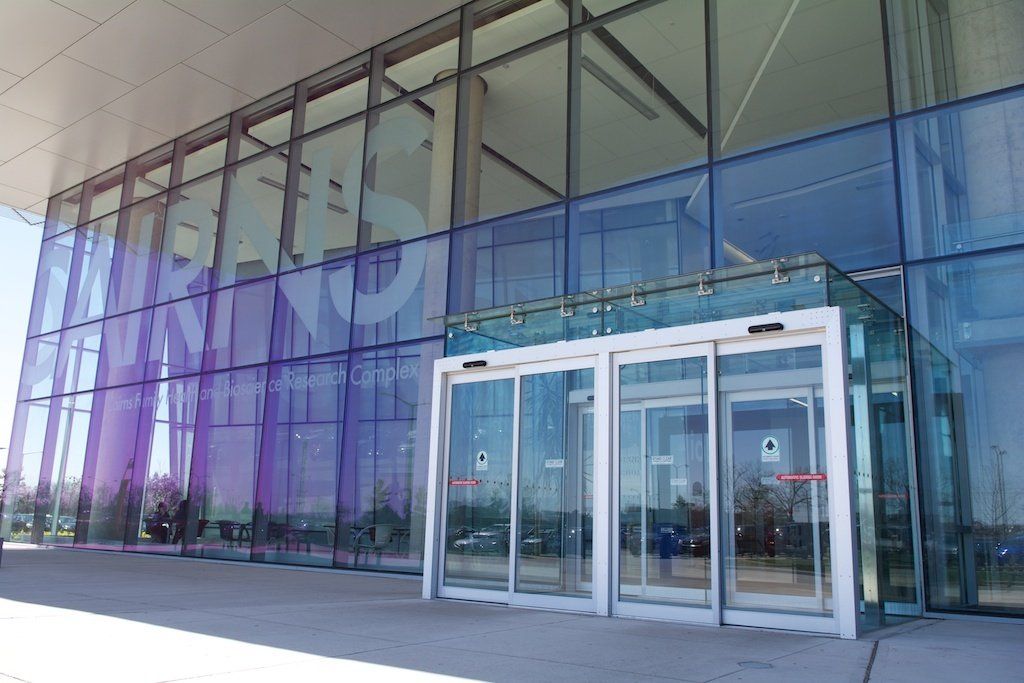
As consumers, many of us take automatic doors and the large variety available for granted. As a business owner, that’s exactly what you want for your customer! The less of a nuisance your entry points are, the better. When choosing an automatic door for your Chicago area business, there are multiple factors to consider.

